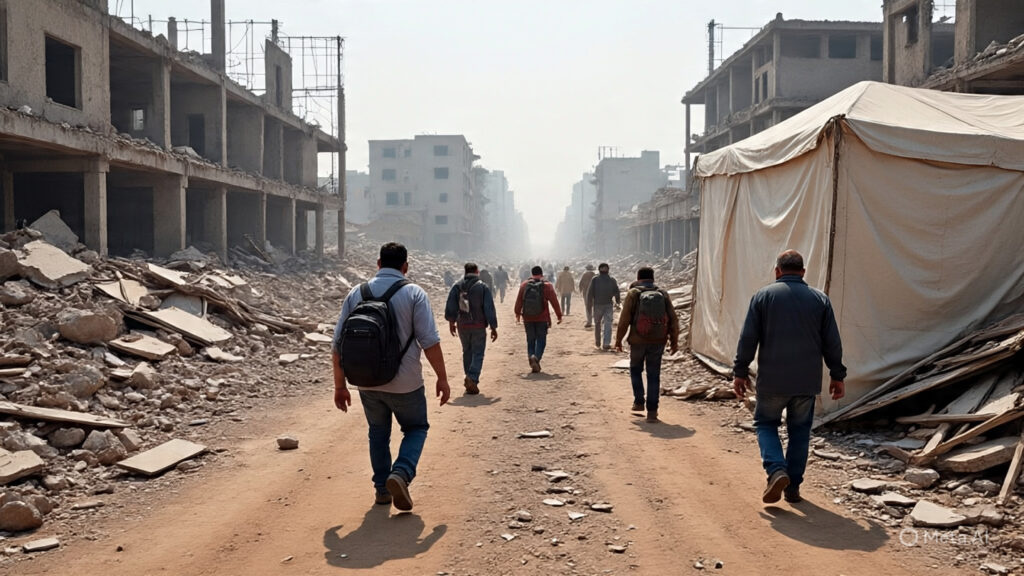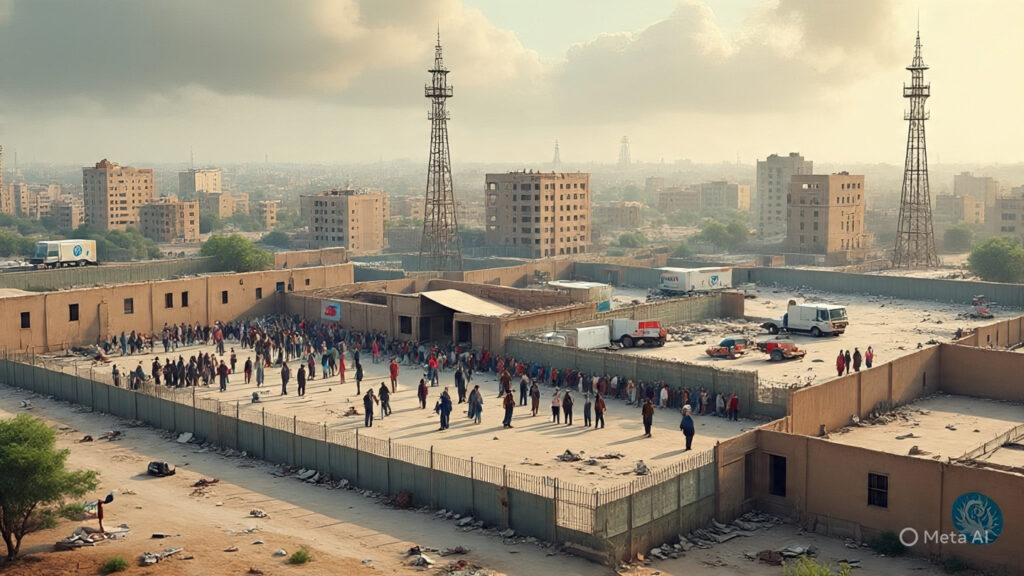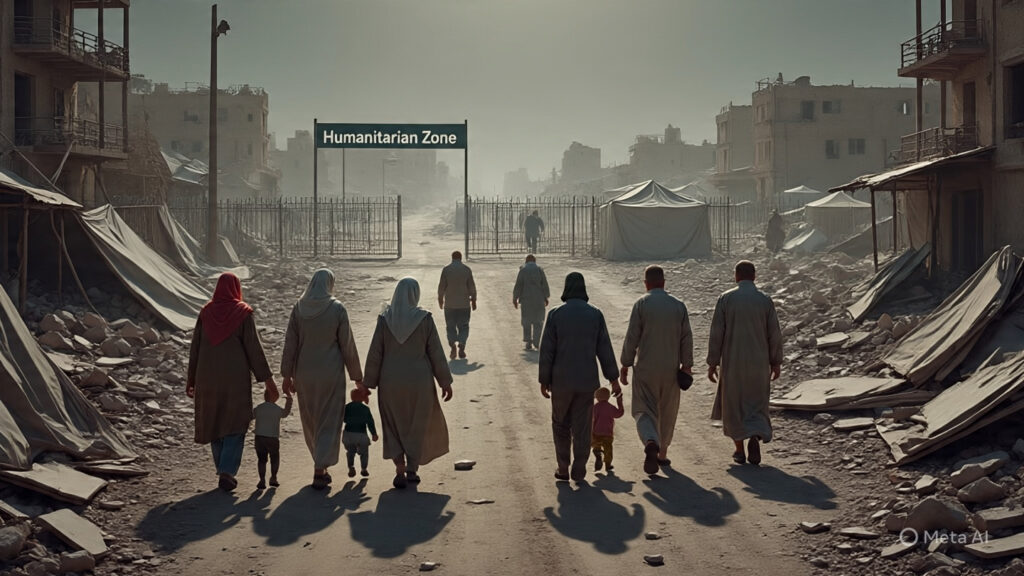Introduction:”Widespread Outrage”
For Palestinians in Gaza, a proposed 60-day ceasefire between Israel and Hamas could be a desperately needed lifeline. After enduring months of war, bombardment, and the near-total collapse of infrastructure, a pause in fighting would offer the chance to bring in urgently required aid—food, water, medicine, and medical support.
However, alongside the negotiations in Doha over the truce and hostage exchange, a controversial proposal from Israel’s Defence Minister Israel Katz is igniting intense criticism.Widespread Outrage, Katz’s plan involves the creation of what he calls a “humanitarian city” in the ruins of Rafah, in Gaza’s south. The city would house nearly all 2.1 million Palestinians living in Gaza—excluding those affiliated with armed groups. International observers, human rights organizations, and many within Israel itself have condemned the idea as unworkable, unethical, and potentially illegal under international law.
Screening, Restriction, and Containment: Key Features of the Plan
According to Katz’s proposal, Palestinians would undergo security screenings before being allowed into the new zone and would not be allowed to leave once inside. The Israel Defense Forces (IDF) would provide security from a distance,Widespread Outrage, while the actual camp management would be outsourced to international organizations. Katz also proposed four aid distribution hubs within the camp and reiterated his support for encouraging “voluntary emigration” of Palestinians from Gaza to other countries.
Katz’s blueprint has not gained much traction, either among Israel’s political leadership or its military command. Israeli media have reported growing tensions, Widespread Outrage,with officials questioning both the feasibility and morality of the plan.
Domestic Opposition: Political and Military Pushback
The proposal has sparked significant disagreement within Israel’s war cabinet. According to reports, a recent cabinet meeting saw a heated argument between Prime Minister Benjamin Netanyahu and IDF Chief of Staff Lt Gen Eyal Zamir. Zamir reportedly rejected the idea, asserting that the army would not participate in forcibly transferring civilians—a move that international law classifies as a war crime.
Tal Schneider, political correspondent for the Times of Israel, noted that Gen Zamir is in a strong position to resist such directives.Widespread Outrage, The government had actively sought his leadership six months ago, and Netanyahu had personally backed his appointment.
But opposition to the plan isn’t limited to top brass. Many lower-ranking soldiers and reservists are also voicing concerns. One notable critic, IDF reservist Yotam Vilk, described the plan as “a form of ethnic cleansing, which is also a form of genocide.” A self-described patriot, Vilk is now part of the group “Soldiers for the Hostages,” which is campaigning to end the war and secure the release of around 50 Israelis still held by Hamas—about 20 of whom are believed to be alive.

Legal and International Condemnation
Sixteen Israeli legal scholars specializing in international law released a joint letter on Friday denouncing Katz’s plan, warning that it would constitute a war crime. They urged all parties involved to publicly withdraw support for the idea, renounce it, and ensure it is not implemented.
Internationally, the backlash has been swift and severe. Widespread Outrage,UK Minister for the Middle East, Hamish Falconer, said he was “appalled” by the proposal, stating that “Palestinian territory must not be reduced” and that civilians must retain the right to return to their communities.
British human rights lawyer Baroness Helena Kennedy KC went further, describing the plan as effectively creating a “concentration camp.” She emphasized that such proposals recall horrific chapters of history, particularly the Holocaust. “The threshold for genocide is high,” she noted, “but what we’re now seeing is genocidal behavior.” Kennedy, a respected figure in international legal circles, said she had long hesitated to label Israel’s actions as genocide but now believes that line has been crossed.
Israel’s Response: Denial and Defence:”Widespread Outrage”
The Israeli government has vehemently rejected accusations of genocide and has described the comparisons to Nazi-era concentration camps as “deeply offensive.” Widespread Outrage,In a statement to the BBC, Israel’s Foreign Ministry maintained that the country adheres to the Geneva Conventions and insists that it does not deliberately target civilians.
Despite this, critics argue that the plan to relocate nearly the entire population of Gaza into a confined, controlled space with no freedom of movement or exit closely mirrors the tactics used in other historical examples of forced population control.
Palestinian Voices: Resistance and Fear
For Palestinians in Gaza, Widespread Outrage,the proposal is yet another blow in a series of traumatic experiences. Many, already displaced multiple times since the war began, are now faced with the threat of long-term containment in what amounts to a massive detention zone.
Sabreen, a woman who had been forced to flee from Khan Younis, told the BBC: “We completely reject this proposal, and we reject the displacement of any Palestinian from their land.
Ahmad Al Mghayar from Rafah echoed her sentiments: “Freedom is above everything. This is our land. We should be free to move wherever we want. Why are we being pressured like this?”

Uncertain Support and Political Calculations
While the idea lacks widespread political backing, a recent poll published in the left-leaning Haaretz newspaper claims that up to 82% of Jewish Israelis support the expulsion of Palestinians from Gaza. Widespread Outrage,However, the far-right ministers in Netanyahu’s government—such as Itamar Ben-Gvir and Bezalel Smotrich—have been notably silent on the plan. Both have previously advocated for Jewish resettlement in Gaza and the removal of Palestinians but have yet to publicly endorse Katz’s proposal.
Analysts suggest they may be waiting to see whether the plan gains more political momentum before aligning themselves with it. As cabinet members, both have access to internal briefings and may view the proposal as more of a tactical maneuver in the ongoing ceasefire talks rather than a concrete strategy.
Ceasefire Talks Complicated by Katz’s Proposal
The proposal is also affecting the ongoing ceasefire negotiations in Doha. Widespread Outrage,Palestinian sources involved in the talks told the BBC that the plan has alarmed the Hamas delegation and added a new layer of difficulty to the already fragile negotiations.
In the absence of a clear post-war strategy from Netanyahu’s government, Katz’s controversial proposal is filling a dangerous vacuum—fueling fears, raising tensions, and risking further destabilization of an already volatile region.

